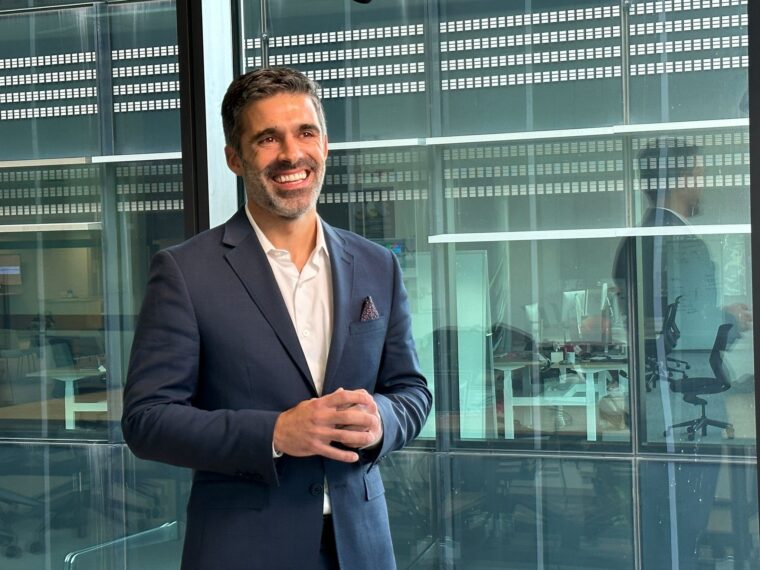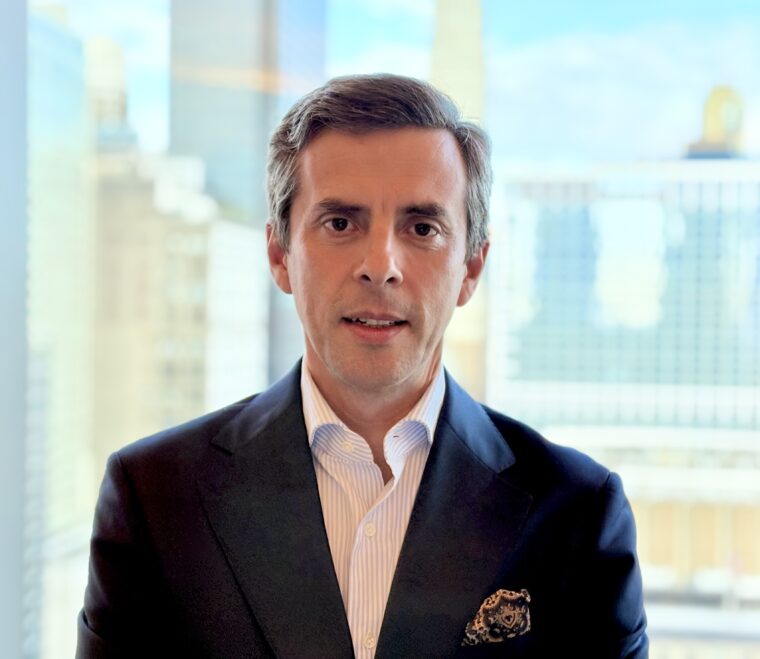As part of the partnership between the Portuguese Diaspora Council and Jornal de Negócios, João Pita Costa, Senior Investigator at IRCAI – International Research Center on Artificial Intelligence, and Counselor of the Western Europe Regional Hub, was interviewed by Jornal de Negócios. In the interview, João Pita Costa discussed his professional journey and identified competitive opportunities for Portugal, its economy, companies, and entrepreneurs in general.
1 – WHAT LED YOU TO LEAVE PORTUGAL?
The choice of Slovenia, where I’ve been living for 14 years, gradually matured starting from my Erasmus exchange in 2005, which had a decisive impact.
Upon returning to Lisbon, I founded and chaired the first AEGEE hub in the city — an association closely linked to the origins of the Erasmus program. In 2006, we organized one of the most popular events of the year, with representatives from the central hub in Brussels, in partnership with the newly created Porto hub, which I also helped establish. The event was such a success that we even received an award.
During my Master’s in Mathematics at the Faculty of Sciences, I maintained a strong connection with the Slovenian lectureship at the Faculty of Arts, led by Mateja Rozman. I was actively involved in cultural initiatives related to the Slovenian language and culture, helping to coordinate several events — some formal — at Mateja’s own invitation, with whom I continue to collaborate. This path eventually led to a PhD in Ljubljana, supported by the Foundation for Science and Technology.
I began my PhD at the end of 2007, which lasted until May 2012. Along the way, I met my Slovenian wife, Dijana, and from that point on, it was clear that Slovenia would become a destination — much more than just a passing phase. Today we have two children, Samuel (10) and Aurora (5), and we live in Ljubljana. We’ve been running a Portuguese–Slovenian magazine — Sardinha (www.eSardinha.eu) — for over 10 years, and we travel to Portugal frequently, mainly in the summer, to Caparica, where I’m from and where my parents and sister still live.
2 – WHAT ADVANTAGES OR DISADVANTAGES HAS THE FACT THAT YOU ARE PORTUGUESE BROUGHT YOU?
It’s interesting to note that Slovenians, who are used to traveling — often long distances, even by bike or hitchhiking — are well aware of the difference between Portugal and Spain. And, unlike in many neighboring countries, they show a clear preference for Portugal and the Portuguese language, even before the country became a popular destination.
Being Portuguese in Slovenia is something exotic and generally well received. Many Slovenians — as well as Croatians, Italians, Austrians, and Hungarians — greatly appreciate our culture. They know more about Portugal than just Cristiano Ronaldo. Even today, when I went to switch from winter to summer tires (which has to be done twice a year by law), the mechanic knew that it had snowed in Madeira in March. These kinds of surprises often come up in everyday conversations.
There are only a few of us living here (around 50), which helps preserve a certain mystique around Portuguese culture. Even so, many have already visited Portugal — some multiple times — and there are people who speak fluent Portuguese, which has been a great asset in maintaining a bilingual cultural magazine, created solely through volunteer work.
3 – WHAT OBSTACLES DID YOU HAVE TO OVERCOME AND HOW DID YOU DO IT?
The main obstacle is the language — although my work in technology doesn’t require Slovenian, and in Ljubljana many people speak good English, Italian, or German. The difference in temperament is often mentioned as a limitation by fellow Portuguese, although Slovenia has a volatile mix of temperaments: more reserved in areas closer to Austria and Hungary, and more open near Italy and Croatia.
However, the biggest challenge is the distance from family in Portugal, especially with the rising cost of flights. It’s essential to ensure that the children spend time with their grandparents and uncles and aunts, maintaining a strong connection to the Portuguese language and identity.
At home, we watch Portuguese television and read Portuguese books, and we regularly meet with other Portuguese–Slovenian families. Together, we apply strategies to keep the Portuguese language alive among the children — and also among the adults.
4 – WHAT DO YOU MOST ADMIRE ABOUT THE COUNTRY YOU ARE CURRENTLY IN?
There is a contagious love for travel, with bars that encourage storytelling of adventures (potopis); a close connection to nature, including hikes through alpine mountains and postcard-like lakes; and a culture that values quality of life over financial wealth — which is why the country is often nicknamed the “Switzerland of the Balkans.” There’s also a rich cultural life spread throughout the country, which we greatly enjoy by living in the capital, just 15 minutes by bike from most venues.
The list of benefits is extensive, with highlights including a healthy work culture, the dedication of Slovenians, and the flexibility of a true 8-hour workday that allows parents to be with their children from 4 p.m. onwards. This is made possible by numerous activities — many of them free and State-supported — that promote the healthy and balanced development of families. It’s also incredibly easy to hop in the car and, within an hour, have lunch in Italy and visit Miramare Castle, or head down to the Adriatic Sea, which feels like a giant pool with dolphins, or climb postcard-perfect mountains and enjoy a beer at a mountain hut (known as koča).
5 – WHAT DO YOU ADMIRE MOST ABOUT THE COMPANY / ORGANIZATION YOU ARE IN?
Since completing my PhD, I’ve been collaborating with the Jožef Stefan Institute (JSI), the Slovenian equivalent of the Gulbenkian Institute of Science, with which I also worked. I’m based in the Artificial Intelligence Laboratory led by Marko Grobelnik and Dunja Mladenic — long before AI became a popular topic, at a time when it was difficult to even hold a conversation about it outside technical circles. Today, the landscape has changed: many opportunities for AI applications have opened up, but so have legitimate concerns about its risks.
Since 2022, I’ve been part of the International Research Centre on Artificial Intelligence under the auspices of UNESCO (IRCAI), hosted at JSI and established by Slovenia’s Ministry of Foreign Affairs, with a global reach and partners from São Paulo to Jakarta. The focus is on promoting AI for Sustainability, guided by the 17 United Nations Sustainable Development Goals. In this context, I’ve been conducting applied research in areas such as public health, water and sanitation, and climate resilience, fostering collaboration between governments, research centers, industry, and start-ups.
Seeing the impact of our work in building technological capacity, training new data scientists in various regions — including underserved contexts — and bridging the digital divide has been central to my professional mission. Slovenia plays a leading role in this effort, hosting IRCAI, the first UNESCO center dedicated to AI, in Ljubljana, where the OECD initiative led by Marko Grobelnik is also based.
6 – WHAT RECOMMENDATIONS DO YOU HAVE FOR PORTUGAL, ITS ENTREPRENEURS AND MANAGERS?
My main recommendation would be to pay close attention to what Slovenian companies and professionals have been achieving and have to offer. It’s no coincidence that Slovenians are suddenly winning the Tour de France, the Giro d’Italia, and other major cycling competitions around the world — just as companies like Cosylab (just a few meters from my home) made the first observation of a black hole in space possible with their controllers.
Though small and sometimes discreet, Slovenia has a solid business fabric that is strategically positioned across various sectors of industry and research, with the potential to deliver impressive surprises. The combination of dedication and agility often translates into remarkable efficiency.
7 – IN WHICH SECTORS OF THE COUNTRY WHERE YOU LIVE CAN PORTUGUESE COMPANIES FIND CUSTOMERS?
This is a complex issue, previously discussed with the Portuguese Embassy. Slovenia places a strong emphasis on its local products, which makes it difficult for foreign wines — including Portuguese ones — to enter the market, as is also the case with Croatian, Italian, and Austrian wines.
Coffee, especially when ground for use in Italian-style stovetop makers, could have potential but faces tough competition from well-established brands like Lavazza and Illy, which are geographically close.
Cheeses and cured meats may have some room for entry, depending on promotion and awareness efforts. I’ve had friends who tried launching a business with fashion items made from cork, but even with the promise of Italian and Slovenian design, they found it hard to gain traction.
8 – IN WHICH SECTORS IN PORTUGAL COULD COMPANIES IN THE COUNTRY WHERE YOU ARE WANT TO INVEST?
Equally challenging, but I would say that the tourism sector may hold a certain advantage, along with food and beverages.
9 – WHAT IS THE COMPETITIVE ADVANTAGE OF THE COUNTRY YOU ARE IN THAT COULD BE REPLICATED IN PORTUGAL?
It’s a small country with very agile dynamics and excellent capabilities in research and certain industrial sectors. There is much that could be replicated, given the circumstances and characteristics of both countries. And of course, the sustainable and resilient nature of Slovenian policies is an excellent starting point.
10 – ARE YOU THINKING OF RETURNING TO PORTUGAL? WHY?
At this stage, I’m quite rooted in Slovenia, and with the children still young, a move wouldn’t be simple. One of the biggest challenges would be maintaining the work–life balance, which could not be compromised — this would require rethinking the way of working in Portugal to ensure daily time with the children.
On the other hand, I intend to strengthen collaborations with Portuguese institutions and make greater use of remote work in order to spend more time with family in Portugal.







